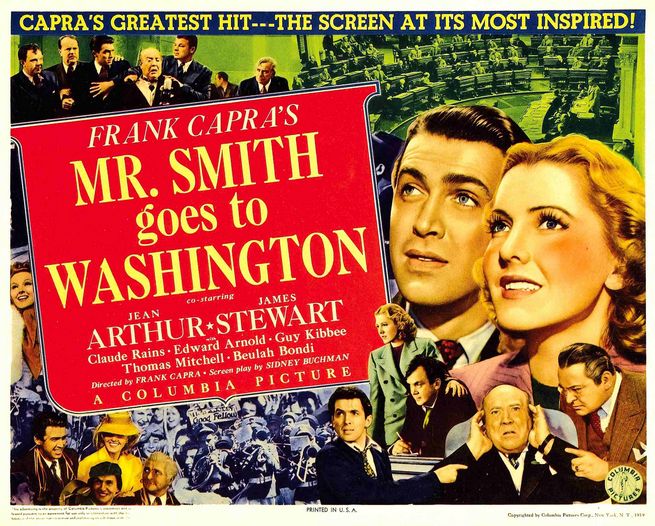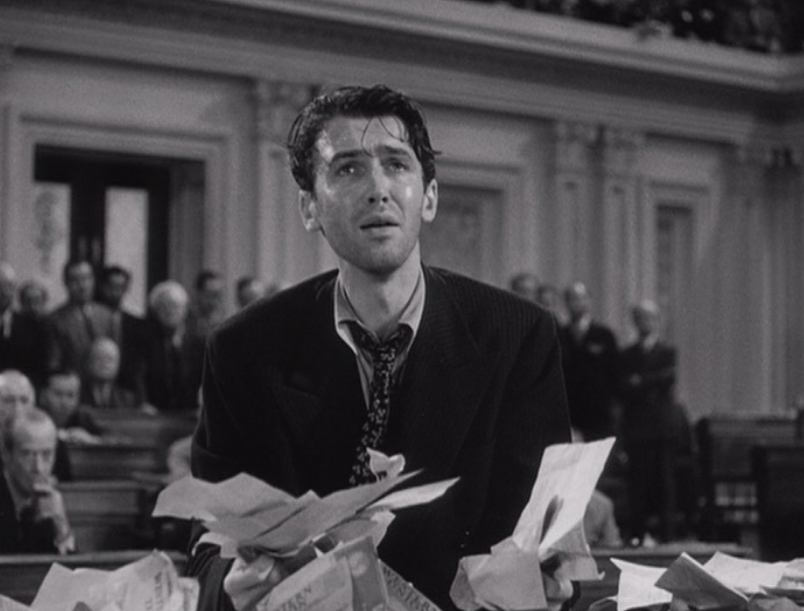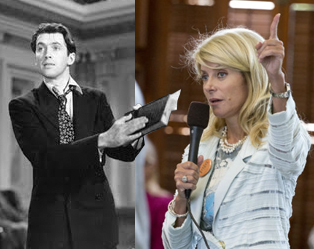Burning Questions: Should We Still Reference Mr. Smith?
 Tuesday, July 2, 2013 at 4:00PM
Tuesday, July 2, 2013 at 4:00PM Serious Film’s Michael C here. With the Fourth of July around the corner it’s a perfect time to examine a classic piece of Americana that has recently re-entered the national conversation.

Last week the movie on the front pages of America's newspapers wasn’t Man of Steel or World War Z. It was a 1939 Capra classic starring Jimmy Stewart. There wasn’t, alas, a nationwide burst of interest in cinema history. Rather, it was the story of Texas state senator Wendy Davis holding the floor in a dramatic 13-hour filibuster in opposition to a bill proposing draconian restrictions on abortion rights. Journalists had to reach back nearly three quarters of a century to the thrilling filibuster climax of Capra’s Mr. Smith Goes to Washington to capture the drama of the incident. Just as Capra's It’s a Wonderful Life is synonymous with sob-inducing Holiday sentiment, so too is Jimmy Stewart’s wide-eyed senator intertwined with courageous political underdogs.
Of course, Capra isn’t such a high pedestal in critical circles as he is in the popular culture. Despite three Oscars for directing, he is often considered corny and clunky, his films hampered by starry-eyed idealism. So with the subject fresh in the news, it seems appropriate to ask if we should update our cultural touchstones.
Is Mr. Smith Goes to Washington still relevant? Was it ever? [more after the jump]
It is not hard to pick out the ways in which the film is dated. Stewart’s hero is unforgivably naïve by today’s standards. The average teenage Daily Show viewer knows better than to expect Washington to operate as it does in the schoolbooks. Furthermore Capra’s story makes no mention of party politics, a scenario that is unrecognizable in today’s climate where every issue is immediately reduced to polarizing red/blue analysis.
There is also the matter of the filibuster itself. The modern filibuster bears little resemblance to Mr. Smith’s dramatic last-ditch maneuver. Today’s Senators have the option of filibustering without standing and talking, so the threat of filibuster is lobbed at nearly every bill that comes out of committee. The image of the US Senator standing alone to orate for hours has all but vanished from American politics.

Having said all that, there is a reason Mr. Smith’s legacy has maintained the power it has. Capra’s films are capable of a darkness that belies their reputation as the epitome of wholesome American treacle. The closing moments of It’s a Wonderful Life are so joyous, it is easy forget the dark path it takes to get there. There is no chorus of Auld Lang Syne heartwarming enough to erase the sight of a half-crazed George Bailey staring over the edge of that bridge in suicidal despair. Likewise, everyone’s memories of Mr. Smith Goes to Washington go immediately to Jefferson Smith arguing with every last ounce of strength on the Senate floor. It’s easy to gloss over how the film earns that rousing conclusion with its damning portrait of rampant political corruption.
Unlike lesser political films, which usually scapegoat a single evil politician, the corruption Jefferson Smith faces is endemic. The political machine of the film’s Boss James Taylor can dictate orders to Congressmen and Governors, stifle dissent, and manipulate the headlines coast to coast. Switch out Taylor for someone like the Koch Brothers or Rupert Murdoch and the film could be ripped from today’s headlines. Throw in the Supreme Court’s recent ruling to allow an unlimited flow of corporate donations into politics and Capra’s choice to focus on coporate influence instead of party labels starts to look less like naïveté and more like prescience.
Like George Bailey after him, Jefferson Smith only triumphs thanks to the intercession of a last minute Carpa miracle, in this case a change of heart from Claude Raines’ Senator Payne. Before that, despite all their gumption, Jeff and his small town supporters are thoroughly crushed under the boot of the big money machine. It makes the eventual victory all the more exhilarating, but by that point it isn’t enough to remove the bad taste from our mouths. You only need to watch the news in passing to know that in reality the Senator Payne’s of the world are not swayed by grand displays of patriotism. They side with whoever is signing the checks. It’s this cynical undercurrent that keeps the film relevant, for all its creakiness and unabashed patriotism.

Without Capra to write a happy ending to Wendy Davis’s story, the Texas Senate is already planning to reintroduce the bill and undo her accomplishment. Yet the tremendous response to Ms. Davis’s spectacle shows that America hasn’t lost the taste for Capra-esque displays of political bravery. As such occurrences near extinction, I would argue Mr. Smith remains important. If only because the alternative is too depressing to bear.
Previous Burning Questions
You can follow Michael C. on Twitter at @SeriousFilm. Or read his blog Serious Film



Reader Comments (5)
I'm in favor. Mr. Smith is the only touchstone available for an incident as dramatic as Wendy Davis's filibuster. What else could we liken it to? Its naivete is part of why it's the right reference point.
the image of the lone orator may have vanished but at least some states still include it in their laws or we wouldn't have had this Wendy Davis moment - bless her!
i can still remember the first time viewing Mr Smith Goes To Washington. Such seizing of the choke-up part of your throat. Capra really knew how to do it (as did Jimmy of course)
I watched the last four hours of the filibuster last Tuesday. Two thoughts were constantly running through my mind:
1. How even the inspirational performance by Jimmy Stewart had nothing on the courageous display by Wendy Davis, her fellow Democratic senators, and the pro-choice crowd.
2. How much Wendy Davis looks like Catherine Deneuve in her 40s and 50s. Seriously. Uncanny.
I'm reading some of you guys find her stand on 22 week abortion heroic? When in reality she is s monster for wanting that in Texas, does anyone remember the filibuster given in Washington about gun rights? No? Well that was something worth talking about not her and her awful ideology.
You raise good points, and they are part of why I've always thought this was overrated. I've long preferred Meet John Doe, and think it's more relevant to politics today.